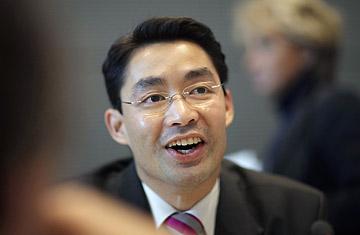
Health Minister Philipp Rösler, prior to a meeting of the Free Democratic Party in Berlin on Oct. 24, 2009
Health-care reform isn't for the faint-hearted. Just ask President Obama. So an air of menace could help Philipp Rösler, Germany's new Health Minister, in his quest to shake up the country's expensive public health-care system. At 36, the Vietnamese-born politician is the youngest member of Chancellor Angela Merkel's new center-right coalition government and the first Asian ever to be appointed a German cabinet minister. Softly spoken and affable, he certainly doesn't seem like a political bruiser. But rumor has it that no one dared challenge him when he attended Catholic school in Hannover because they thought he was some kind of martial arts enthusiast. "Everyone always thinks that just because you're Asian, you must be able to do karate," Rösler told an interviewer recently from the news magazine Stern.
In fact, Rösler has lived in Germany since he was 9 months old, when his German parents adopted him from an orphanage in Vietnam. He went on to study medicine, gaining not only a detailed insight into his new portfolio but also the nickname "Doc." In 1992, at the age of 29, however, he gave up a promising medical career to enter politics, joining the economically liberal Free Democrats (FDP). In 2003, he was elected to the regional parliament in Lower Saxony, and six years later, after working his way up the ranks of the FDP, he became Economy Minister of Lower Saxony. His appointment to head the German Health Ministry on Wednesday caps a meteoric rise to the top.
Rösler now has one of the most difficult jobs in Merkel's cabinet. As Health Minister, he'll come under intense pressure from the myriad lobbyists, medical insurers, doctors' groups and pharmaceutical companies as he attempts to change the financing structure of the country's health-care system. The appointment of a relative ingénu to this key post caused widespread surprise. One newspaper carried the headline: "FDP Youngster in a Dogfight." But some analysts say his youth and inexperience in federal government will not be a huge issue. " Rösler is very competent, he's a doctor and he's already served as minister in the regional government in Lower Saxony," Oskar Niedermayer, a political science professor at the Free University of Berlin, tells TIME.
Merkel has said that health-care reform will be one of her new government's top priorities. Although medical treatment in Germany is among the best in the world, the country's health-care system faces an uncertain future due to exploding costs, a rapidly aging population and a burdensome bureaucracy. About 90% of Germany's 82 million people are covered by the country's public health insurance companies, which are currently funded by contributions from employers and employees. Merkel's reform plan is expected to include a freeze on employer contributions — shifting the burden to individuals — and the creation of a government commission to study the possibility of moving from income-based contributions to a flat-rate health insurance charge. Union leaders say the unemployed and pensioners would suffer the most under such a system. "There'll be plenty of bitter conflicts over tax and health reform once [Merkel's] policies are implemented," Niedermayer predicts.
Rösler was sworn into office with 14 other cabinet members at a ceremony in Berlin on Wednesday, four weeks after parliamentary elections gave Merkel's Christian Democrats (CDU/CSU) enough seats to form a government with the FDP. With the FDP leader Guido Westerwelle becoming Vice-Chancellor and Foreign Minister and the party also claiming the key economics portfolio along with international development and justice, the Free Democrats are aiming to leverage their junior coalition position for maximum effect. Rösler, as the party's rising star, will no doubt figure prominently in their plans.
Merkel, also formally re-elected as Chancellor for a second term on Wednesday, chaired the first meeting of her new cabinet before embarking on a diplomatic tour that will include a stop in Washington to address a joint session of Congress on Nov. 3. It's a rare honor — the last German Chancellor to do this was Konrad Adenauer in 1957. While in Washington, Merkel will also get a glimpse of the tortuous negotiations that are taking place on health-care reform in the U.S. — and she may come to wonder whether her fresh-faced new Health Minister is really up to the gargantuan task back home.
